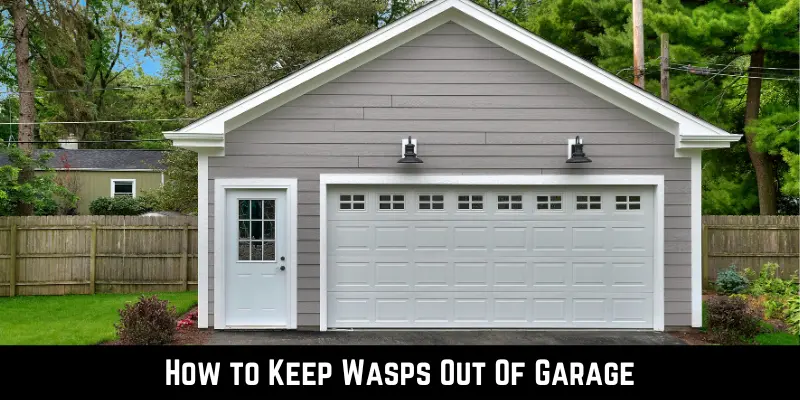Dealing with wasps can be a real headache, especially when they decide to make your garage their new home. Many homeowners find themselves at a loss, not knowing how to handle this situation effectively. Are you wondering, “How to keep wasps out of garage?” Well, you’re not alone.
The answer lies in a combination of preventative measures and timely interventions. From natural deterrents to more robust extermination methods, there are a variety of strategies that can help you maintain a wasp-free garage. Understanding the behavior of wasps and why they are attracted to certain environments is key.
No one likes the idea of sharing their garage with wasps, and rightfully so. It’s time to take control and reclaim your space. So, are you ready to say goodbye to these pesky invaders?
Understanding Wasps and Their Nature
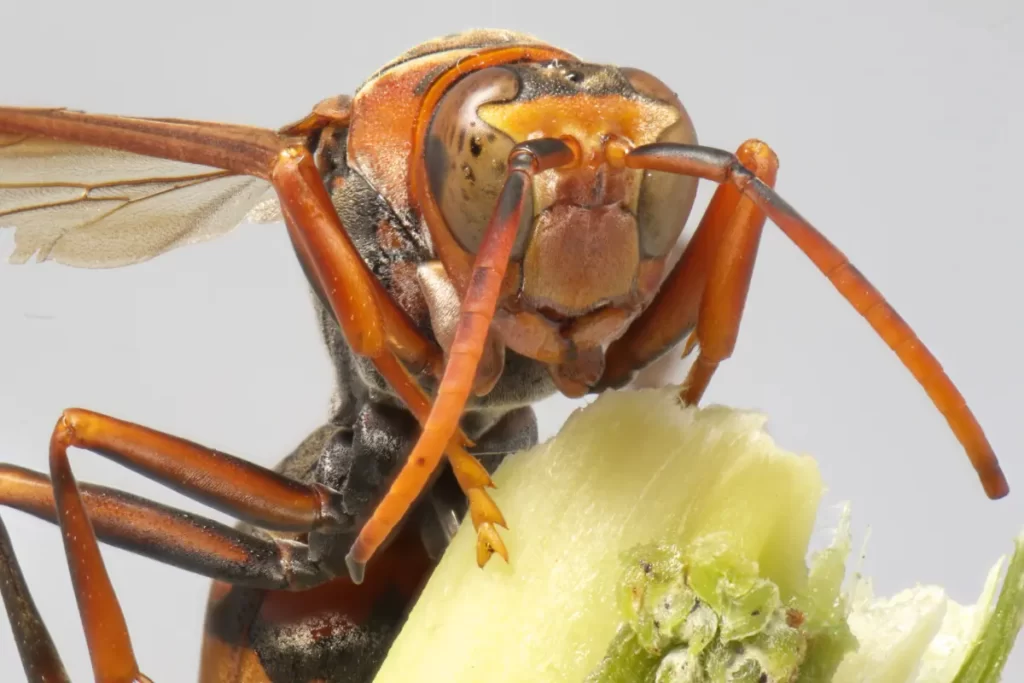
Wasps are flying insects, similar to bees, but they behave differently. They are a part of the insect world that helps in controlling the population of other pests. However, wasps can become a problem when they decide to live close to humans. They have a slender body, and some can sting more than once. Unlike bees, wasps do not lose their stinger. This means they can attack if they feel threatened.
It’s important to know that wasps play a part in nature. They hunt and eat other insects. This is how they help in controlling the number of pests. In gardens, they can be helpful. But, when wasps build nests in places like garages, they become a nuisance. They are territorial and may see humans as a threat. This is why they might sting.
Wasps are more active in the warmer months. In spring and summer, they build their nests and look for food. They like sweet things and proteins. So, if there is food lying around, wasps will come. They also look for places that are sheltered to build their nests. Garages are often perfect for this because they are dry and safe from rain.
Understanding wasps is the first step to dealing with them. They are a part of nature, but when they are too close to humans, they can cause problems. Learning about their behavior helps in knowing how to keep them away safely. This is important for keeping our homes and spaces wasp-free.
Why Wasps Might Choose Your Garage
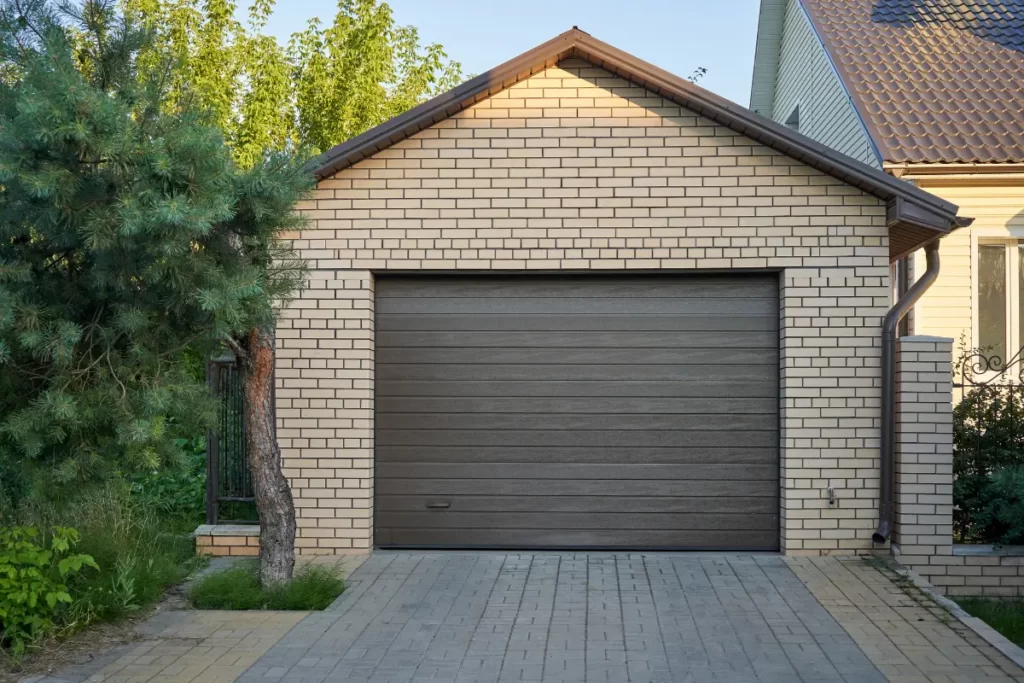
A garage can be an attractive place for wasps. Why? Because it offers them what they need. Wasps look for sheltered spots to build their nests. A garage is often quiet, has less foot traffic, and provides protection from weather. These factors make it a top choice for wasps.
Food is another big reason. Wasps like protein and sweet things. If there are open bins, leftover pet food, or sugary spills in your garage, wasps will find it. Once they find a good food source, they will want to stay close. This is when they might decide to build a nest in your garage.
In addition to food and shelter, garages also provide wasps with easy access to the outdoors. They can fly in and out easily. This is important for them as they hunt for food and take care of their nest. Your garage becomes a safe base for them.
But why is this a problem? Wasps can be aggressive. They protect their nest and can sting if they feel threatened. Unlike bees, a wasp can sting multiple times. This makes them a threat, especially if you have children or pets.
How Long Can a Wasp Live In A Garage?
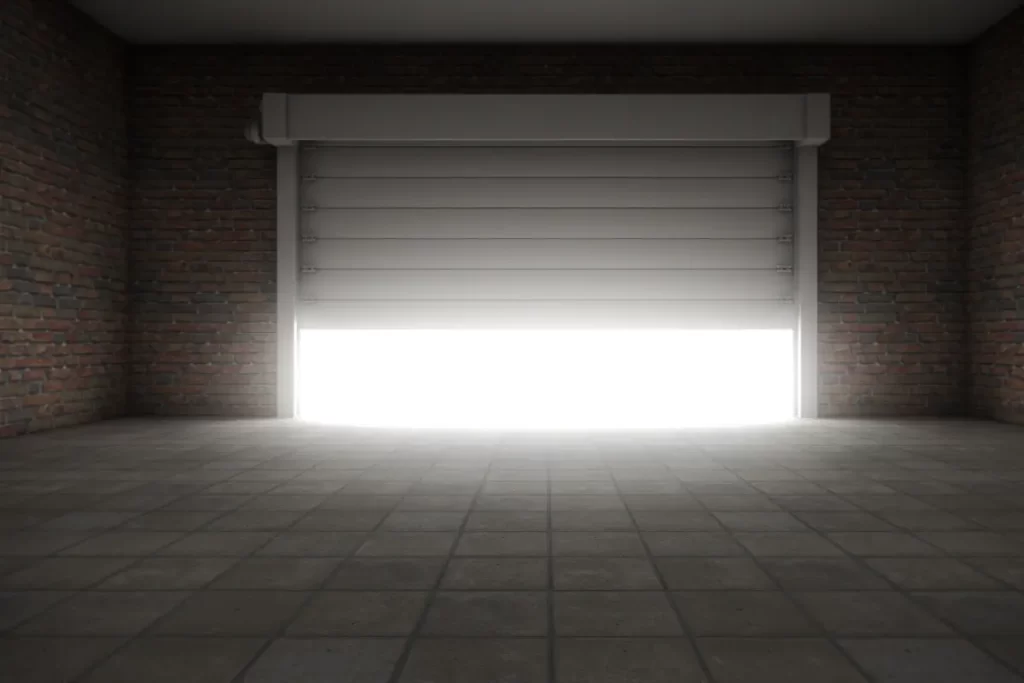
A wasp’s lifespan can vary based on its role in the colony, but typically it ranges from a few weeks to several months. However, when it comes to living in your garage, it’s more about how long the nest stays active. A wasp nest in a garage can stay active for a whole season, which can last from spring until late summer or early fall.
During the spring, a queen wasp will look for a place to start her colony, and your garage might just be the perfect spot. It’s sheltered, dry, and safe from predators. Once she starts building her nest and laying eggs, worker wasps come to life. They take over the duties of expanding the nest and looking for food.
The worker wasps do all the hard work. They build, protect the nest, and gather food. They live for about 12-22 days, working tirelessly. The queen, on the other hand, stays in the nest laying more eggs. She can live for several months, up to a year in some cases.
As summer ends and fall begins, the colony produces new queens and male wasps for mating. After mating, the male wasps die, and the new queens find a place to hibernate through winter. The rest of the colony, including the old queen, will die off.
So, if wasps have made a home in your garage, they could be there for the entire warm season. This is why it’s important to take steps to keep them out and deal with any nests as soon as possible.
Why Do Wasps Keep Coming In My Garage?

You might wonder, “Why are these wasps so interested in my garage?” Well, there are several reasons:
- Shelter: Garages offer a dry, protected space, ideal for wasps to build their nests.
- Food Sources: Leftover pet food, open garbage bins, or spilled sugary substances can attract wasps.
- Easy Access: An open garage door is an open invitation for wasps to enter.
- Less Human Activity: Garages are often less busy than other parts of a home, making them more appealing to wasps.
- Ideal Nesting Spots: Wasps look for undisturbed areas to build their nests. Shelves, ceiling corners, or unused equipment in garages provide perfect spots.
Understanding these reasons can help you take preventive measures. Keep your garage clean, seal food containers, and minimize clutter. Regularly check for early signs of nests and deal with them promptly. This way, you can make your garage less inviting to wasps and keep them out for good.
Do Wasps Make Nests In Garages?
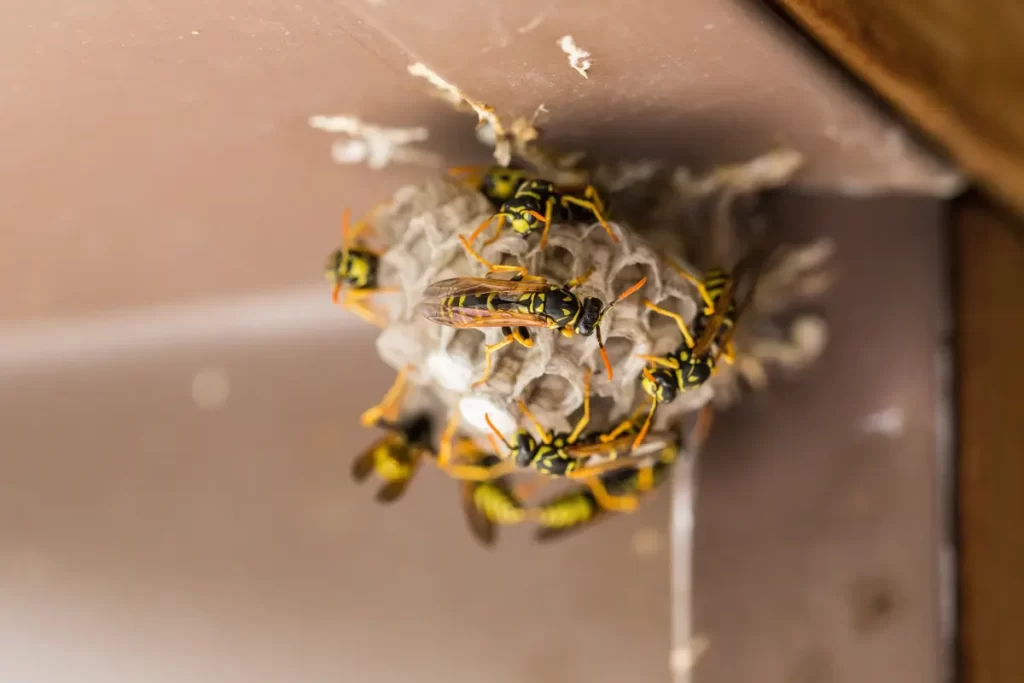
Yes, wasps can and do make nests in garages. They find garages attractive because they offer a sheltered, safe space away from harsh weather and predators. The inside of a garage is often quieter and less disturbed than other parts of a house, making it a prime spot for a wasp to build its home.
Wasps typically build their nests out of chewed wood fibers mixed with their saliva. In a garage, they might set up their nest in ceiling corners, on shelves, or even in unused equipment or boxes. The nests start small but can grow significantly over the summer if left undisturbed.
It’s important to deal with wasp nests in garages promptly. While wasps play a role in controlling other pest populations, they can become aggressive if they feel their nest is threatened. A wasp sting can be painful and, for those allergic, potentially dangerous.
To prevent wasps from nesting in your garage, keep it clean, minimize clutter, and regularly check for early signs of nests. If you do find a nest, it’s often best to call a professional to remove it safely.
By taking these steps, you can keep your garage wasp-free and safe for use. Simple precautions and awareness can go a long way in preventing these unwelcome guests.
How To Keep Wasps Out Of Garage?
Using Natural Wasp Repellents

If you’re looking to keep wasps out of your garage, using natural repellents can be a safe and effective method. Below is a table listing 12 natural wasp repellents and instructions on how to use them:
| Natural Repellent | How to Use |
| 1. Peppermint Oil | Mix a tablespoon of peppermint oil with water and a few drops of dish soap. Spray around your garage, focusing on areas where wasps might enter or build nests. |
| 2. Eucalyptus Oil | Place a few drops of eucalyptus oil on cotton balls and distribute them around your garage. The scent repels wasps. |
| 3. Clove Oil | Mix clove oil with water and spray in areas prone to wasp nests. Wasps dislike the strong smell. |
| 4. Cucumber Slices | Place cucumber slices in your garage. Wasps dislike the acidic property of cucumbers. |
| 5. Citrus Peel | Scatter citrus peels around your garage. The scent of citrus is unpleasant to wasps. |
| 6. Vanilla Extract | Mix vanilla extract with water and use it as a spray around the garage. Wasps are not fans of vanilla scent. |
| 7. Baby Powder | Sprinkle baby powder at the entrance of the garage and in nooks and crannies. It acts as a deterrent. |
| 8. White Vinegar | Mix equal parts white vinegar and water in a spray bottle. Apply it around the garage, especially near potential nest sites. |
| 9. Garlic | Crush a few garlic cloves and place them in areas where wasps are active. The smell of garlic repels them. |
| 10. Bay Leaves | Scatter bay leaves around your garage. Wasps do not like the smell of these leaves. |
| 11. Cinnamon | Sprinkle cinnamon powder near wasp activity areas. Wasps dislike the scent. |
| 12. Mint Plants | Grow mint plants near the entrance of your garage. The natural aroma of mint keeps wasps away. |
By utilizing these natural repellents, you can create an unwelcoming environment for wasps, helping to keep them out of your garage. Remember to reapply these remedies regularly, especially after rain, to maintain effectiveness. Natural solutions provide a safer alternative to chemical repellents, ensuring a wasp-free space without harming the environment or your health.
Immediate Solutions
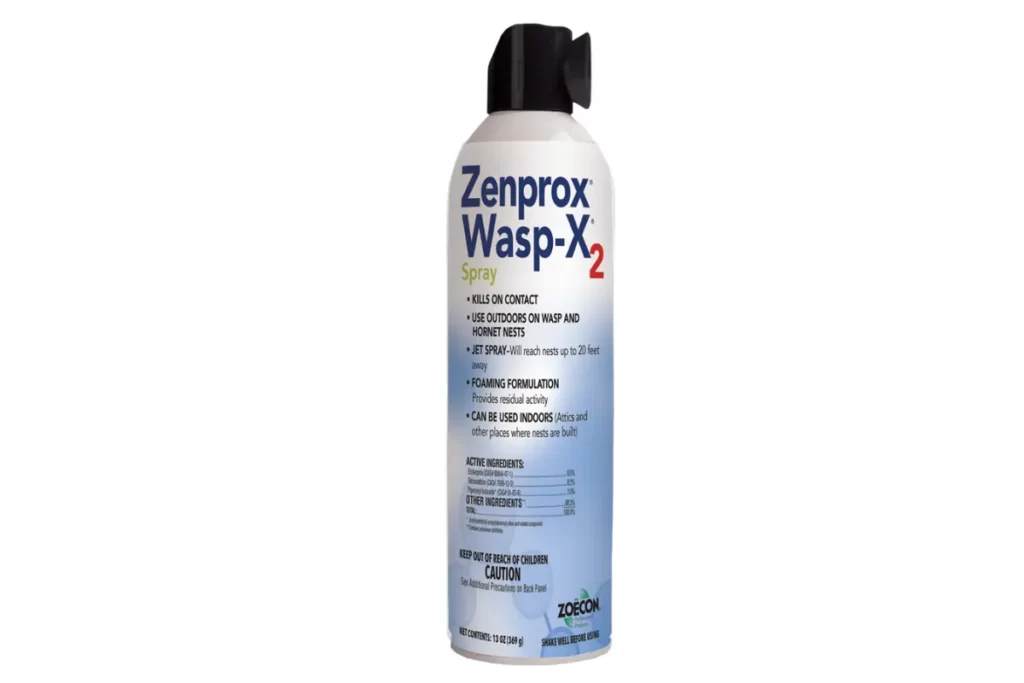
If wasps are bothering you right now, you need quick solutions to get them out of your garage. Here are some immediate actions you can take:
- Close the Garage Door: Keep the garage door closed as much as possible. This prevents wasps from flying in.
- Remove Attractions: Clear out any food sources or sweet-smelling substances that might attract wasps. This includes open garbage bins, pet food, or sugary drinks.
- Seal Trash Bags: Make sure all trash bags in the garage are tightly sealed. Wasps are drawn to the smell of garbage.
- Check for Nests: Look around your garage for any small wasp nests. If you find any, and they are about the size of a golf ball or smaller, you might be able to knock them down safely with a long pole. However, if the nest is bigger, or if you are allergic to stings, it’s safer to call a professional.
- Use Wasp Spray: If you need a quick fix and are comfortable using it, a commercial wasp spray can be used to kill wasps on contact. Make sure to follow the instructions on the label carefully.
- Turn Off Lights: At night, turn off the garage lights. Wasps are attracted to light, so keeping the area dark can help keep them away.
- Use a Fan: If you have a fan in your garage, turn it on. The strong air current makes it difficult for wasps to fly, and they might leave.
By taking these immediate actions, you can reduce the number of wasps in your garage and make it a safer space. Remember, safety first. If the wasp problem is severe, it’s best to call in professionals.
Using Wasp Sprays
Wasp sprays are a popular choice when dealing with these stinging insects. They are effective and provide a quick solution. When using wasp sprays, aim directly at the nest or the wasps from a safe distance. Most sprays have a range of several feet, allowing you to keep a safe distance. It’s best to do this in the evening or early morning when wasps are less active. After spraying, wait a day to make sure all the wasps are gone before removing the nest.
Always follow the instructions on the wasp spray can. Wear protective clothing to minimize the risk of getting stung. Keep children and pets away from the area until you are sure it is safe.
Using wasp spray in your garage can quickly reduce the number of wasps, making it safer for you and your family. Just remember to use it safely and follow all the guidelines.
Safe Removal Of Wasp Nests
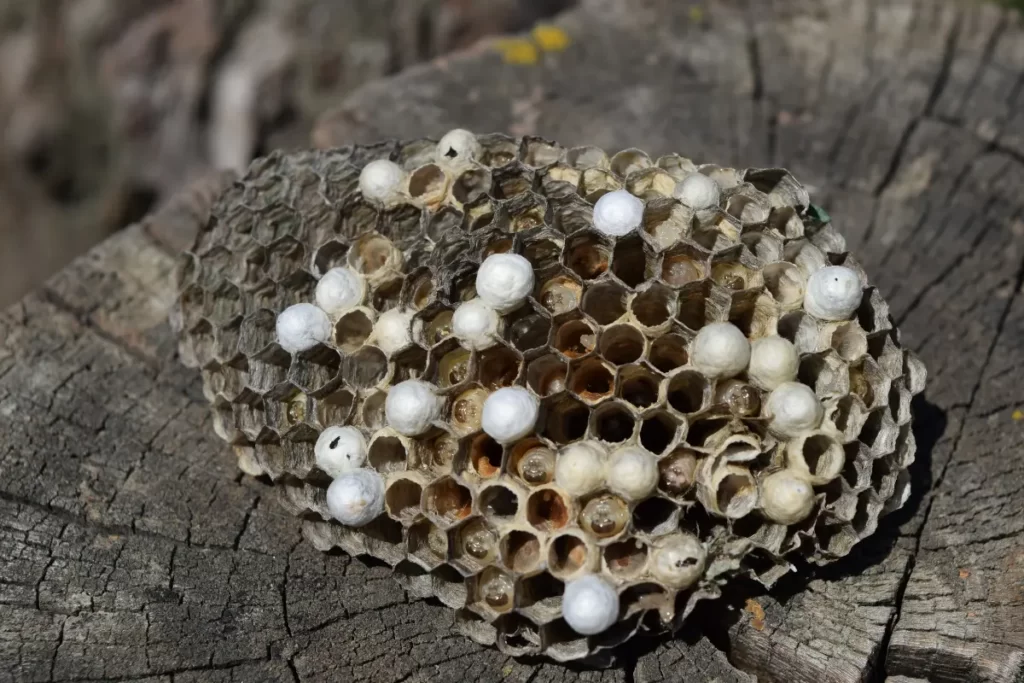
If you find a wasp nest in your garage, it’s important to remove it safely to prevent wasps from coming back. If the nest is small and wasps are not active, you might be able to knock it down using a long pole. However, for larger nests or if you are unsure, it’s safer to call a professional.
Professionals have the right equipment and protective clothing to safely remove wasp nests. They can also provide advice on how to prevent wasps from coming back in the future.
After the nest is removed, clean the area thoroughly to remove any scent marks that might attract other wasps. Keep an eye out for any signs of new nests and deal with them promptly.
Traps And Their Effective Placement
Wasp traps can be an effective way to reduce the number of wasps in your garage. You can buy traps from a store or make your own using a soda bottle and some bait (such as sugar water, fruit juice, or meat).
Place the traps near the entrance of your garage, but not inside it. You want to catch the wasps before they get in. Check the traps regularly and clean them out as needed.
Using traps in combination with other methods, such as keeping your garage clean and using natural repellents, can provide a comprehensive solution to keep wasps away.
Other Effective Methods
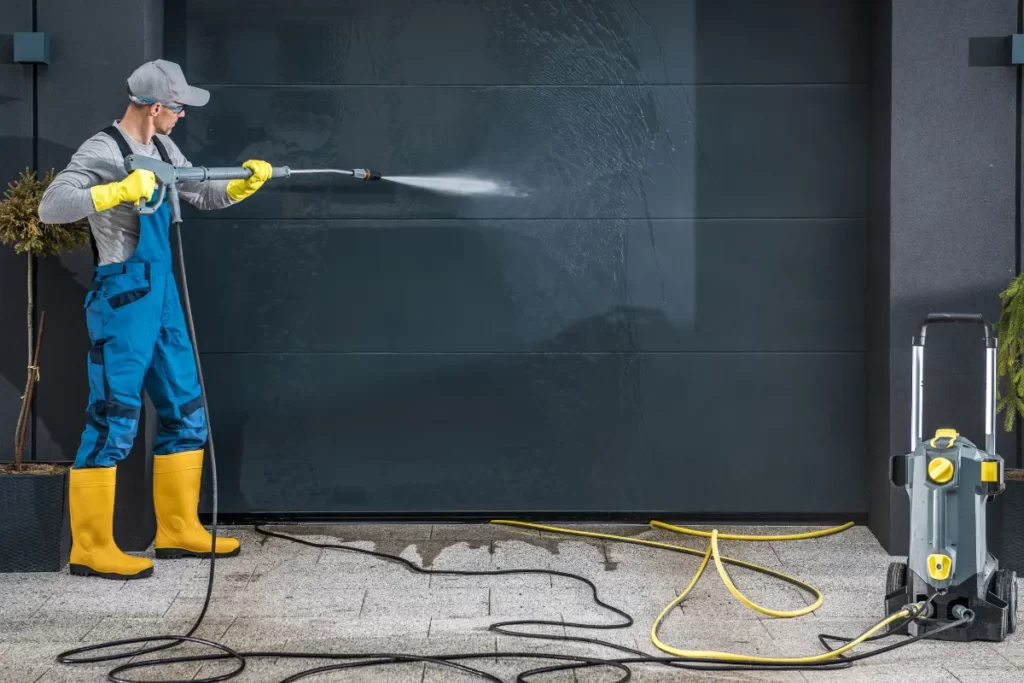
Apart from using sprays, natural repellents, and traps, there are several other strategies you can employ to keep wasps out of your garage. Implementing these methods can help create a comprehensive plan to maintain a wasp-free space.
- Maintain Regular Cleaning: Keep your garage clean and clutter-free. Wasps are attracted to areas that provide shelter for nesting, and clutter provides numerous such spots. Regular cleaning reduces the chances of wasps settling down in your garage.
- Seal Entry Points: Inspect your garage for any cracks, holes, or openings. Wasps can squeeze through even the smallest of spaces to enter your garage. Use caulk or another appropriate sealant to close these gaps and prevent wasps from getting inside.
- Install Screens: If you like to keep your garage door open for ventilation, consider installing screens. These allow air to flow freely while keeping wasps and other pests out.
- Use Decoys: Wasps are territorial creatures. They’re less likely to build a nest if they think another colony is already present. Hanging a decoy wasp nest can deter new wasps from moving in.
- Light Modification: Wasps are attracted to certain types of light. If possible, switch out your garage lights to sodium vapor bulbs, which are less attractive to wasps.
- Remove Water Sources: Like all living things, wasps need water to survive. Make sure there are no standing water sources in or near your garage. Fix any leaking faucets or pipes promptly.
- Stay Vigilant: Regularly inspect your garage for signs of wasp activity, especially during the spring and summer when they are most active. Early detection makes it easier to deal with a wasp problem before it becomes severe.
- Use Wasp-Repelling Plants: There are certain plants that wasps dislike, such as wormwood, mint, and basil. Consider planting these near your garage to deter wasps naturally.
By combining these methods with the strategies mentioned earlier, you can create a multi-layered approach to keep wasps out of your garage effectively. Remember, persistence is key, and regular maintenance can go a long way in preventing wasp infestations.
Identifying Wasp Nests
Wasp nests are unique structures that can be found in various locations around a property, including garages. Identifying a wasp nest early is crucial to preventing an infestation and ensuring safety.
Wasps typically build their nests out of chewed wood fibers, creating a papery appearance. The nests have a rounded shape and may have a single entrance at the bottom. They can vary in size, from a golf ball to larger than a basketball, depending on the species and the age of the nest.
The color of a wasp nest can be gray or brown, and it will appear to have a somewhat textured surface due to the layers of chewed wood. Inside, the nest will have numerous cells where wasps lay their eggs. You might notice adult wasps flying in and out of the nest, particularly during the day when they are most active.
If you suspect you have found a wasp nest in your garage, it’s crucial to proceed with caution. Do not attempt to remove the nest yourself if you are unsure of how to do it safely or if you have an allergy to wasp stings. Contacting a pest control professional is often the safest option.
Common Nesting Places In A Garage
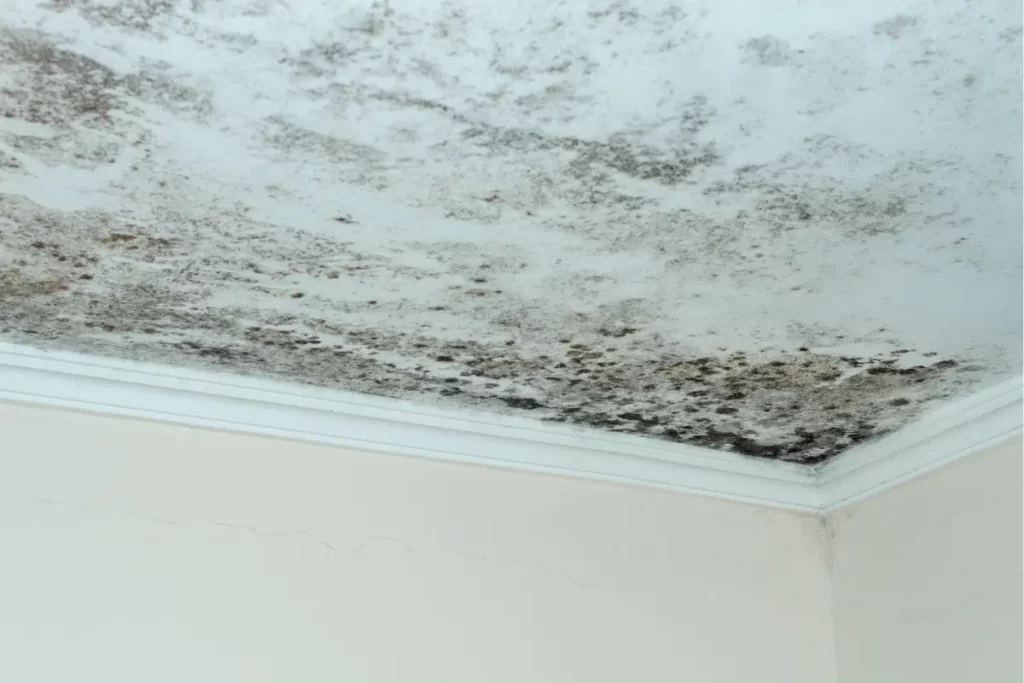
Wasps look for secure and sheltered spots to build their nests, making garages a popular choice. Here are some common nesting places within a garage:
- Ceilings and Corners: Wasps often build their nests in the upper corners of a garage or along the ceiling.
- Shelves and Cabinets: Any flat surface, such as shelves or inside cabinets, can provide a suitable spot for a wasp nest.
- Behind Items: Wasps might build nests behind items hanging on the walls or stored against them.
- In Vents or Ducts: Vents and ducts offer a protected space for wasps to build their nests.
- Under Workbenches: The space under workbenches can also attract wasps looking for a nesting site.
Regularly checking these areas can help you spot any potential nests before they become a significant problem.
Distinguishing Features of a Wasp Nest
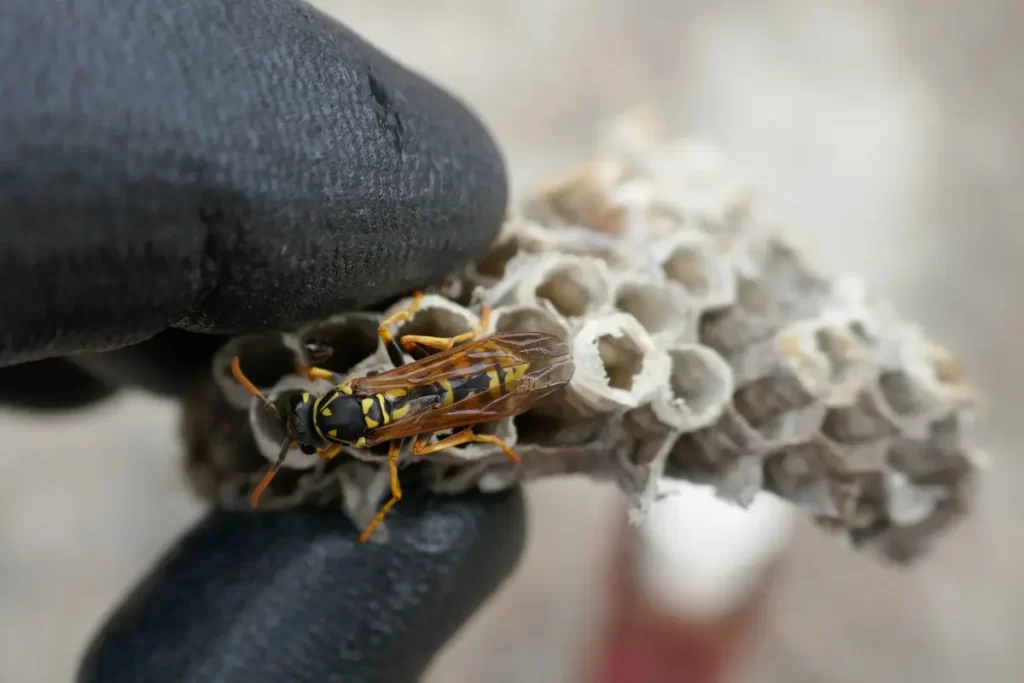
Recognizing the distinguishing features of a wasp nest can help you identify and deal with them safely. Here are some key characteristics:
- Material: Wasp nests are made from a papery substance created by chewing wood fibers mixed with saliva.
- Shape: Most wasp nests have a rounded shape, and they can be either open or enclosed, depending on the species.
- Color: The nests are typically gray or brown.
- Texture: The surface of a wasp nest appears layered and textured.
- Size: The size can vary widely, from a few inches across to much larger, depending on how long the nest has been active.
- Location: Wasps choose sheltered locations for their nests. In garages, this could be in corners, on ceilings, or behind stored items.
By being able to identify wasp nests and their common locations, you can take steps to deal with them promptly, ensuring the safety of your garage and its users.
Preventative Measures
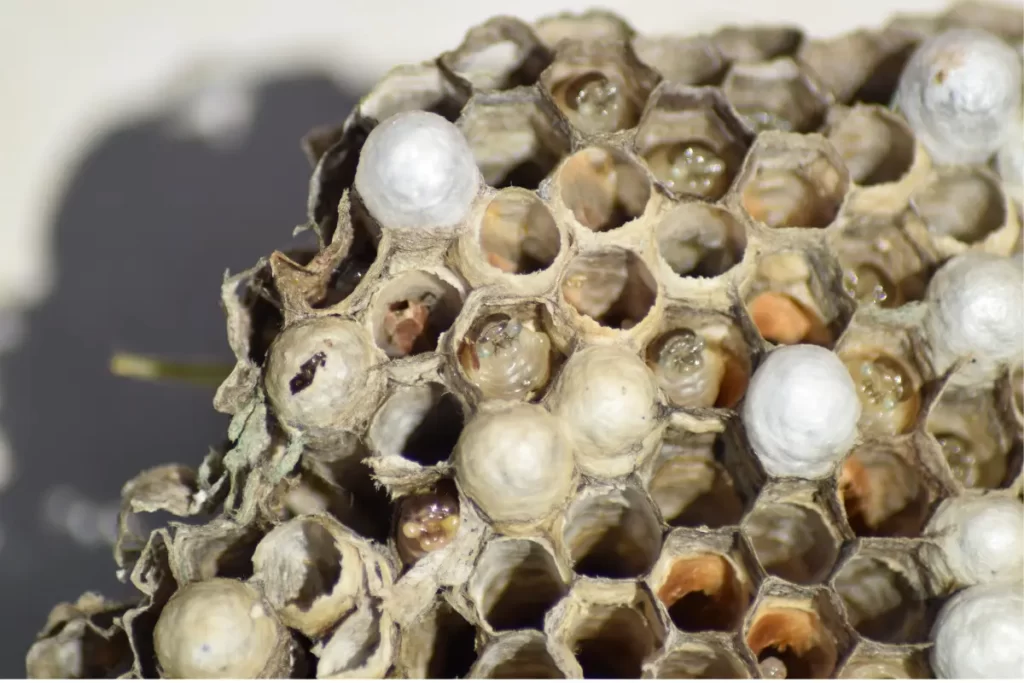
Taking preventative measures is key in keeping wasps away from your garage. By being proactive, you can create an environment that is less attractive to these stinging insects, significantly reducing the risk of an infestation.
Start by regularly inspecting your garage for any signs of wasp activity. Look out for individual wasps, nests, or even the early stages of nest building. Pay close attention during the warmer months, as this is when wasps are most active.
Ensure that all food items are stored in sealed containers, and clean up any spills immediately. Wasps are attracted to food, especially sweets and proteins. If they find a consistent food source in your garage, they are more likely to stick around.
Make use of natural wasp repellents. Plants like mint, basil, and wormwood can deter wasps. Consider placing these plants near the entrance of your garage.
Properly Sealing Garage Entry Points
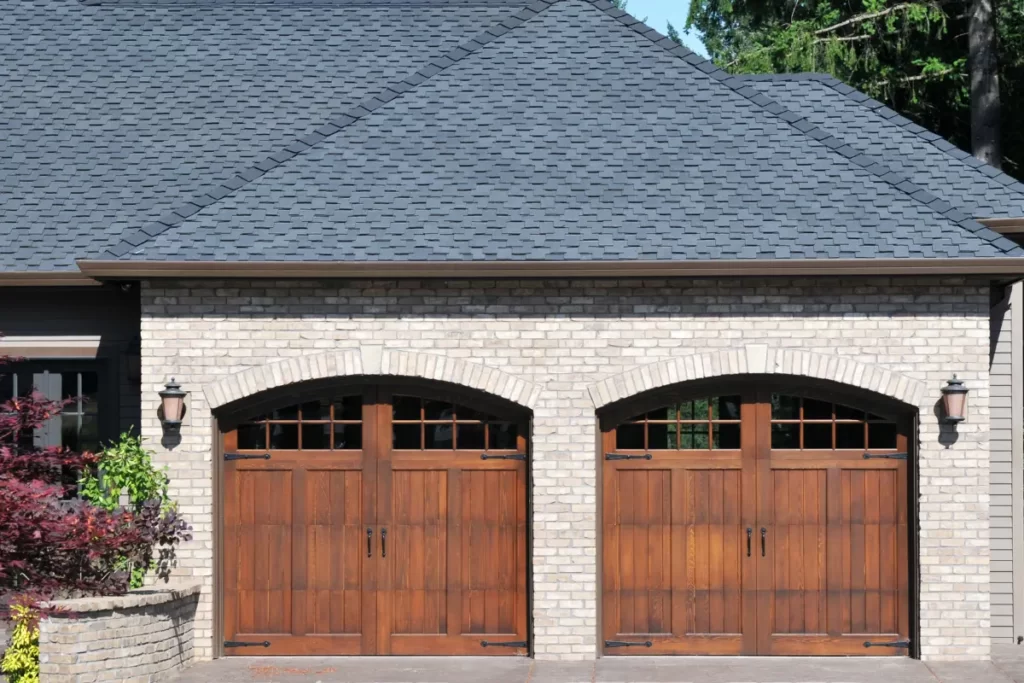
One of the most effective ways to keep wasps out of your garage is by ensuring that there are no entry points for them to get inside. This means conducting a thorough inspection of your garage and sealing any cracks, holes, or gaps.
Check the garage doors and windows to ensure that they close properly and that there are no gaps. If you find any, use weather stripping to seal them. Pay attention to the edges and corners, as these are common areas for gaps to occur.
Look for cracks in the walls and foundation of your garage. Even small cracks can be an entry point for wasps. Use a suitable sealant to fill in these cracks.
Don’t forget to inspect vents and other openings. Ensure that they are covered with fine mesh to keep wasps out while still allowing for ventilation.
Keeping The Garage Clean And Clutter-Free
A clean and clutter-free garage is less attractive to wasps. They are looking for places to build their nests that are sheltered and undisturbed. By keeping your garage tidy, you are reducing the number of potential nesting sites.
Regularly clean your garage, paying attention to corners and other hidden areas where wasps might build their nests.
Keep items stored in sealed containers and off the floor. This not only helps to reduce clutter but also makes it easier to spot any signs of wasp activity.
If you have recycling bins in your garage, ensure that they are sealed and that any bottles or cans are rinsed out before being placed in the bin. The sweet residues left in these containers can attract wasps.
By implementing these preventative measures, you can create a garage space that is less inviting to wasps, helping to keep them at bay.
Long-Term Solutions
Maintaining a Regular Cleaning Routine
Ensuring a wasp-free garage goes beyond just a one-time cleaning or fix. It requires a commitment to a regular cleaning routine, making the space unattractive to these pests over the long term. Regular cleaning helps to disrupt any early attempts by wasps to establish a nest, and it keeps the space less cluttered, removing potential hiding spots.
Set aside time each week to tidy up and inspect the garage. Pay attention to the corners, ceiling, and other less obvious spots where wasps might start building a nest. Remove any cobwebs, as this can also deter wasps from settling in.
Ensure that all food debris is cleaned up promptly, and if you store any food items in the garage, keep them in sealed containers. Garbage bins should also be sealed and emptied regularly, as the smells can attract wasps.
Consider integrating natural wasp repellents into your cleaning routine. Certain essential oils, such as peppermint oil, have been known to repel wasps. Mix a small amount with water and use it as a natural cleaning spray in areas where wasps might be tempted to nest.
Consider Professional Pest Control
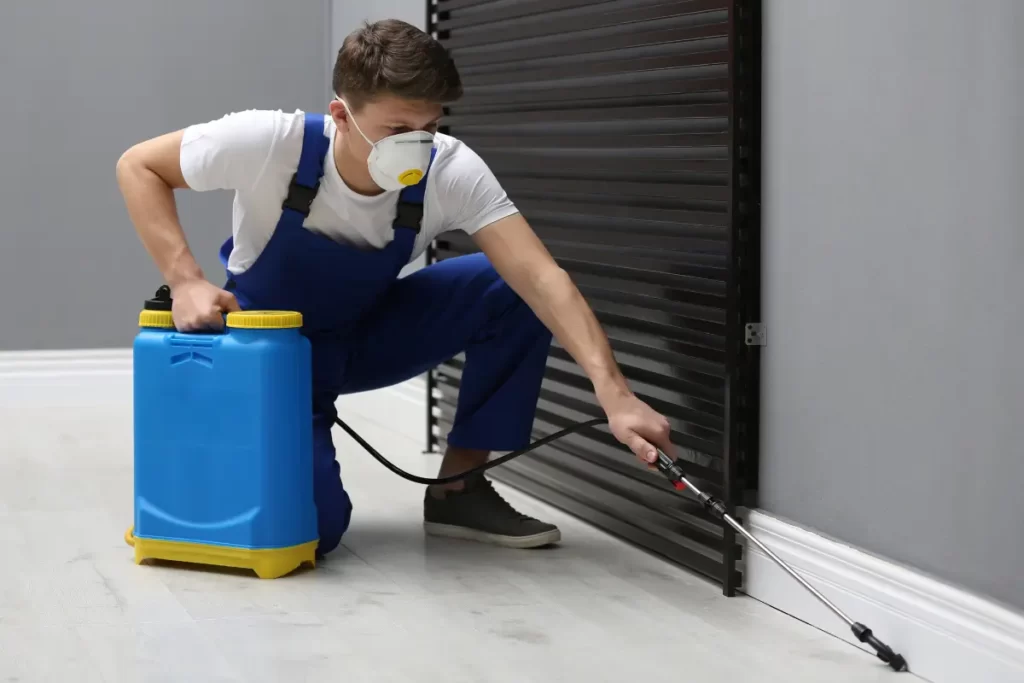
Sometimes, despite our best efforts, wasps can still become a problem. In these cases, it might be wise to consider professional pest control services. These professionals have the experience, knowledge, and tools to effectively and safely deal with wasp nests, reducing the risk of stings or other complications.
Pest control experts can conduct a thorough inspection of your property, identify potential problem areas, and provide recommendations on how to make your garage less inviting to wasps. They can also safely remove any existing nests, ensuring that the wasps do not return.
Establishing a regular pest control maintenance program can provide peace of mind, knowing that a professional is keeping an eye out for any potential wasp problems and taking preventive measures to keep your garage wasp-free.
By considering long-term solutions such as maintaining a regular cleaning routine and seeking professional pest control when necessary, you are taking proactive steps to keep your garage safe and wasp-free.
Conclusion
Keeping wasps out of your garage is crucial for ensuring a safe and comfortable space. Throughout this guide, we’ve explored various strategies, ranging from understanding wasp behavior to implementing immediate and long-term solutions.
A key takeaway is the importance of preventative measures. By maintaining a clean and clutter-free garage, sealing potential entry points, and using natural repellents, you can create an unwelcoming environment for wasps. Remember, regular inspections are vital in spotting early signs of wasp activity and dealing with them promptly.
